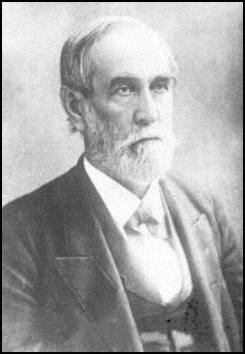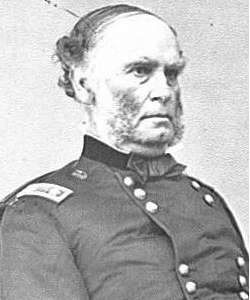 John S. Phelps (pictured left) was a lawyer and a Democrat Missouri congressman. At the outbreak of the Civil War in 1861, he enlisted as a private in the Missouri Infantry. He was promoted to lieutenant colonel on October 2, 1861 and to colonel December 19, 1861. By special arrangement with President Lincoln, Phelps organized an infantry regiment which bore his name, Phelps’s Regiment, Missouri Volunteer Infantry. The regiment spent most of the winter of 1861—62 as the garrison of Fort Wyman at Rolla. In March 1862, Phelps led his regiment in the fierce fighting at Pea Ridge in Arkansas. He was mustered out May 13, 1862. In July 1862, he was appointed by President Lincoln as Military Governor of Arkansas.
John S. Phelps (pictured left) was a lawyer and a Democrat Missouri congressman. At the outbreak of the Civil War in 1861, he enlisted as a private in the Missouri Infantry. He was promoted to lieutenant colonel on October 2, 1861 and to colonel December 19, 1861. By special arrangement with President Lincoln, Phelps organized an infantry regiment which bore his name, Phelps’s Regiment, Missouri Volunteer Infantry. The regiment spent most of the winter of 1861—62 as the garrison of Fort Wyman at Rolla. In March 1862, Phelps led his regiment in the fierce fighting at Pea Ridge in Arkansas. He was mustered out May 13, 1862. In July 1862, he was appointed by President Lincoln as Military Governor of Arkansas.
During 1862 he was very outspoken over the alleged cotton speculation by Federal soldiers and officers in Arkansas. On two separate occasions he wrote to Gen. Halleck and Secretary of War, Stanton, complaining about cotton speculation and specifically, Maj. Gen Samuel R. Curtis (pictured bottom right).
That Federal officers, especially Colonels such as Charles E. Hovey (33rd Illinois) were profiting from cotton speculation is not a surprise. That generals would also do it, is not. However, Phelps implications of Curtis are, as very, very few biographies of him mention anything concerning his possible involvement in cotton profiteering. It may not seem like a big deal, but regular soldiers died and these officers became rich as a result.
Over the coming weeks I will look into the cotton speculation in Arkansas along the Mississippi and will offer my final report before writing what I hope will be an interesting article.
On September 28, 1862 Phelps wrote to Halleck concerning some rumors:
From Saint Louis, under date of August 17, I wrote you, stating the rumors in relation to the seizure of cotton and the speculations in that article, in which it was said officers of high rank were engaged. Such rumors are current here in relation to the conduct of some of the officers, and the late commander of this Army of the Southwest is not exempt from such charges. I have not investigated these rumors. The army was much demoralized in its march from Batesville to this point and whilst lying here. In my letter I suggested the course I deemed expedient in relation to cotton, and time has satisfied me I was right in those suggestions. Much property has been taken from the citizens in this vicinity and but little of it has been accounted for to the Government.
 He is of course referring to Curtis’s Army of the Southwest. As you will see, Phelps is suggesting that Curtis kept his army near cotton rich areas for the sole purpose of cotton speculation. Entire brigades would be sent out on cotton stealing and confiscating missions that would cost the lives of many soldiers. The cotton speculating trickled down all the way to colonels and surgeons.
He is of course referring to Curtis’s Army of the Southwest. As you will see, Phelps is suggesting that Curtis kept his army near cotton rich areas for the sole purpose of cotton speculation. Entire brigades would be sent out on cotton stealing and confiscating missions that would cost the lives of many soldiers. The cotton speculating trickled down all the way to colonels and surgeons.
Stay tuned…